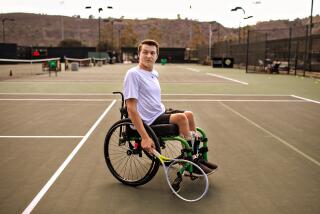A Harmonic Convergence : Business and Pleasure Mix Nicely for Mike Dempsey, the Reigning World Wheelchair Ping-Pong Champion and President of His Own Company
You stand across the Ping-Pong table from Mike Dempsey, one of the best players in the world. He sends a serve spinning over to your side. The ball hits and flies crazily in an unexpected direction, but you recover and backhand a weak return to Dempseyâs left. With a flick of his paddle, he fires a scorcher that bounces over your shoulder at a velocity approaching Mach 1.
Dempsey is embarrassing you despite being at an obvious disadvantage: He is sitting in a wheelchair. You think that anybody in a wheelchair shouldnât have lateral movement, but Dempsey, throwing the paddle from one hand to the other like a gunslinger, has deceptive range. You think no one should be able to hit a ball and operate a wheelchair at the same time, but Dempsey makes it look easy.
Dempsey would be a remarkable player--even if he wasnât in a wheelchair. Blessed with catlike reflexes and an amazing arsenal of shots, he is able to beat ranked able-bodied players, but it is in wheelchair tournaments that he is practically unbeatable. A nine-time world wheelchair champion, Dempsey, 32, won the gold medal last year at the Paralympics in Seoul.
Dempsey lost the use of his legs when he was 6 months old, but, âIâve always done whatever I wanted to do,â he says. âEverybody has limitations, whether theyâre physical, mental or emotional. Physical limitations are more visible. But everybody has their own situation to deal with.â
Dempsey has always been a Ping-Pong prodigy. As a tyke in Columbus, Ohio, he regularly dispatched five older sisters on his parentsâ basement table. In sixth grade, he won a school tournament, in effect becoming the neighborhood champ against schoolmates who had two good legs. At 13, he won the national wheelchair competition. When he was 15, he finished second in the Paralympics.
Dempseyâs legs were paralyzed when a doctor accidentally bruised his spinal cord with a hypodermic needle--he was being given a shot for âa normal baby virus,â he says. Dempsey was too young to remember the accident. Nor does he remember any reality other than being in a wheelchair.
âIt wasnât a matter of readapting,â he says. âThey say you have a period of bitterness when you have something and lose it, but this being the only thing I ever knew, Iâm not bitter. I was always a pretty happy kid.â
Dempsey, who has a resonant voice and a deep, booming laugh, lives in Oxnard and works in Camarillo. He is president of Kuschall of America, a company that manufactures ultralight wheelchairs. One of the rooms in the plant is not used for business. Itâs the Ping-Pong room. The familiar green table stands in the middle. On the floor are dozens of balls, many of them squashed. Dempsey practices against some of his 20 employees who win as often as the Stiga Robot, a machine that serves to him.
Dempsey positions himself as close to the table as possible to cut down angles. Using a variation of the handshake grip, he plays an âaggressive defenseâ style. Able-bodied players have an advantage on the serve, especially with a dink shot that he has to reach for (the dink is illegal in wheelchair competition). His toughest opponents are those who play defensively rather than blast away.
With the next world wheelchair championship a year away, Dempsey has eased off on practice and tournament appearances. If heâs in serious training, heâll lift weights, âput milesâ on the wheelchair, practice five or six days a week and play in tournaments twice a month.
âAfter 15 or 20 years of competition,â he says, âyou have to pick your spots in order to get psyched up.â
When he was younger, Dempsey also competed in such wheelchair sports as tennis, basketball and track (he was fifth in the 1,500 meters at the 1976 Paralympics). Although he does an occasional 10K now, he concentrates on table tennis almost exclusively.
âWheelchair sports have gotten so competitive, you have to specialize,â he says. âYou canât be a Jack-of-all-trades and expect to win.â
Dempsey moved to California in 1975 because of the weather. A 1977 graduate of De Anza College in Cupertino, he made his living investing in stocks and real estate before starting his wheelchair company three years ago. Wheelchairs, he says, have improved because of wheelchair sports; competitors need wheelchairs that are sleek and light.
âThe same features that make a wheelchair good for sports make it good for everyday use,â Dempsey says. Although he is not an activist for the rights of the disabled, Dempsey believes that he can raise âpublic awarenessâ by playing table tennis so well.
âItâs an important reason that people know about the abilities of the disabled,â he says. Then he picked up his paddle and proved it.
More to Read
Go beyond the scoreboard
Get the latest on L.A.'s teams in the daily Sports Report newsletter.
You may occasionally receive promotional content from the Los Angeles Times.






